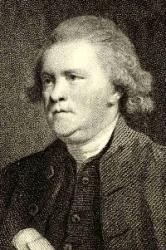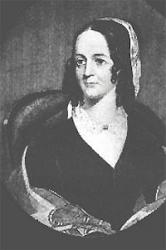1788 - 1863 Hymnal Number: d21 Author of "Blest hour, when mortal man retires [aspires]" in Massachusetts Sabbath School Hymn Book Thomas Raffles was born in London in 1788. He studied at Homerton College, and in 1809 became pastor of a Congregational society at Hammersmith. In 1812, he removed to Liverpool, where he was minister in the Great George Street chapel. This position he held for forty-nine years. He died at Liverpool, in 1863. He published several sermons, letters of travel, poems, and hymns for the use of his congregation.
--Annotations of the Hymnal, Charles Hutchins, M.A. 1872.
=======================
Raffles, Thomas, D.D., LL.D., son of Mr. W. Raffles, solicitor, was born in Princes Street, Spitalfields, London, May 17, 1788. In 1803 he became a clerk in Doctors' Commons, but shortly after retired, and through the influence of Dr. Collyer, of whose church at Peckham he was for some time a member, he entered Homerton College in 1805. His stated ministry began at Hammersmith, where he was ordained as a Congregational minister on June 22, 1809. In 1812 he removed to Liverpool, where he succeeded the Rev. T. Spencer, and remained for 49 years the honoured pastor of the Great George Street Congregational Church. He died at Liverpool, Aug. 18, 1863. For upwards of fifty years Dr. Raffles was one of the most prominent ministers of the Congregational body. His labours outside of his own congregation were very great, his aid as a preacher on behalf of missions and other religious works, being eagerly sought after. The Lancashire Inde-pendent College owes its existence mainly to him; and to many religious works in Liverpool he gave great personal attention. His degree of LL.D. was conferred by the University of Aberdeen in Dec. 1820, and that of D.D. by Union College, Connecticut, in July 1880. His works include Memoirs of the Life and Ministry of the Rev. Thomas Spencer, 1813; A Tour on the Continent, 1817; and several Sermons, &c. He also edited the 1815 edition of Brown's Self-Interpreting Bible; was joint author with J. B. Brown and J. H. Wiffen, of Poems by Three Friends; and joint editor with Dr. Collyer and Dr. J. B. Brown, of the Investigator, a London quarterly. As early as March 8, 1813, he says, in a letter to his friend, Mr. Brown, "I am about to put to press a collection of hymns for the use of my chapel:" but this intention was not carried out until 1853, when he published his Supplement to Dr. Watts's Psalms & Hymns. His son's history of this Supplement is:—
"Early in January, 1853, he published his long-expected Supplement to Dr. Watts's Psalms and Hymns, which he had in hand for many years. He would never have published it at all, but, in common with other Independent Ministers, would have used the Congregational Hymn-book [J. Conder's 1836 and 1842] had that book contained a fair share of his own hymns. In its original form, however, it did not contain one [yes, one, but given as Anonymous]; and Dr. Raffles might, without vanity—seeing that numerous hymn-books of modern date contained one or more of his hymns—-have expected that they would not have been wholly omitted from the hymn-book emphatically of his own denomination. But so it was, and he never would introduce it, though, with the greatest readiness, when the improved edition was contemplated [theNew Congregational Hymn Book, 1859], under the editorship of the Rev. Dr. Gr. Smith, Dr. Raffles contributed some of his hymns to its pages. His own collection is very good, but limited in extent; the hymns are selected with considerable Judgment; and the true versions, as written by the respective authors, are given, wherever the original source could be reached."— Memoirs, 1864, p. 419.
Dr. Raffles contributed, in 1812, eight hymns under the signature "T. B." to the Collection of his old friend and former pastor, Dr. Collyer. Gradually other hymns came into notice. These, with others to the number of 46, were included in his Supplement, 1853. His hymns at present in common use include:—
1. Blest hour, when mortal man retiresPrayer. In the "R. MS." this is headed "The Hour of Prayer," and at the foot is written by Dr. Raffles, “Printed in the Amulet for 1829, and thence copied into the Christian Observer." It is dated " Jany. 26,1823," and is in 6 stanzas of 4 lines.
2. Cause of all causes, and the Source. Hymn to the Deity. Contributed to Dr. Collyer's Collection, 1812, No. 914, in 5 st. of 6 1.
3. Come, heavenly peace of mind. Peace of Mind. Pub..in Collyer's Collection, 1812, No. 915, in 3 st. of 10 1. In the "R. MS." this, in a revised and expanded form of 10 stanzas of 6 lines, is undated; but underneath Dr. Raffles has written "Printed in the American Xtian Keepsake for 1838."
4. Eternal Father, throned above. Doxology. In the "R.MS." this is in 1 st. of 8 1., and headed "Doxology." It is undated, and underneath is written by Dr. Raffles at a later date (the change in the ink proving this) "Published anonymously in the Congregational Hymn Book," i.e., J. Conder's 1836 and 1842.
5. Father of mercies, God of love, 0 hear a humble, &c. Lent. Appeared in Collyer's Collection, 1812, No. 909, in 6 st. of 6 1., and headed "The Penitent's Prayer."
6. Go, preach the Gospel to the poor Home Missions. In the "R.MS." in 7 st. of 4 1., headed "To the Agents of the Liverpool town mission," and dated "May 1849." At the foot is written "Printed at the Printing Office of the Liverpool Town Mission Bazaar, Lycaeum, Bold Street."
7. High in yonder realms of light. Heaven. Contributed to Collyer's Collection, 1812, No. 911, in 6 st. of 8 1. It was sung at Dr. Raffles's funeral, Aug. 24, 1863. It is the most widely known of his hymns, but is usually given in an abbreviated form.
8. Lord, like a publican I stand. Lent. Dated in the "R.MS." "Seacombe, Oct. 4th, 1831," and headed, “The Publican, Luke xviii. 13." It is in 5 st. of 4 1., and is in several collections.
9. No night shall be in heaven! No gathering gloom. Heaven. In 8 st. of 4 double lines, headed “And there shall be no night there," Rev. xxii. 5, and dated " April 4, 1857." ("R.MS.")
10. 0 God of families, we own. Family Worship. In the "R.MS." in 5 st. of 4 1., entitled "The God of the families of Israel," and dated, "Jany. 15th, 1823." It appeared in the New Song, 1859.
11. Rapid flows the stream of tune. New Year. The last but one of his New Year's hymns, in 6 st. of 8 1., entitled "Hymn for New Year's Morning," and dated, "Jany. 1st, 1861." ("R.MS.")
12. Saviour, let Thy sanction rest. Holy Matrimony. In the “R. MS." in 6 st. of 6 1. entitled “The Marriage Feast," and dated "November 3rd, 1852. On occasion of the marriage of the Rev. J. F. and Mrs. Guenett." Included in the New Congregational Hymn Book, 1859, with the omission of st. v., vi.
13. Sovereign Ruler, Lord of all. Lent. No. 813 in Collyer's Collection, 1812, in 6 st. of 4 1.
14. The cup which my Father hath given. In Affliction. In the “R.MS." in 2 st. of 8 1., but without date. In theMemoirs. 1864, p. 272, the history of the hymn from Dr. Raffles's Diary is this :—
"Ashby-de-la-Zouch, 16th [Oct., 1828.] I preached to an immense congregation last night at Nottingham, and slept at Mr. Gilbert's. Mr. Rawson [of Nottingham Castle], a fine young man, and but recently married, has broken a blood-vessel, and with his wife and mother, and father and sister, set out yesterday for Devonshire, to pass the winter. Mrs. Rawson sent me her album, and begged me to insert something appropriate. As I dressed in the morning I composed the following lines, which I sent her just before they set out: ‘The cup, &c.'"
Mrs. Rawson, soon left a widow, resided at Wincobank Hall, near Sheffield, nearly 60 years, and died there in 1887.
15. Thou art my Hiding-place, 0 Lord. The Hiding-place. In the "R.MS." in 4 st. of 8 1., and dated “Burnley, June 23rd, 1833."
16. What is life? A rapid stream. Life. In the “R.MS." in 6 st. of 4 1., and dated in pencil 1838. At the foot is written by Dr. Raffles "Originally published in the Investigator, and, anonymously, in Affection's Gift, a poetical selection published by Simpkin and Marshall, Hamilton, &c, London."
The "Raffles MS.," from which we have annotated these hymns, was kindly lent by Mr. T. S. Raffles, B.A., Stipendiary Magistrate of Liverpool. Mr. Raffles is the author of his father's Memoirs, 1864, and of hymn 25 in his father's Supplement. Dr. Raffles's original Hymns were published in 1868, with a Preface by J. Baldwin Brown.
--John Julian, Dictionary of Hymnology (1907)
Thomas Raffles


